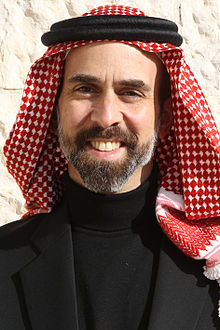
Abdullah II bin Al-Hussein is King of Jordan, having ascended the throne on 7 February 1999. He is a member of the Hashemite dynasty, who have been the reigning royal family of Jordan since 1921, and is considered a 41st-generation direct descendant of the Islamic prophet Muhammad.
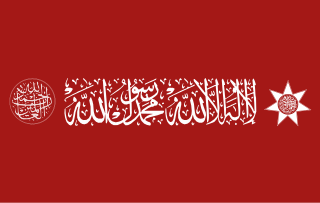
The Hashemites, also House of Hashim, are the royal family of Jordan, which they have ruled since 1921, and were the royal family of the kingdoms of Hejaz (1916–1925), Syria (1920), and Iraq (1921–1958). The family had ruled the city of Mecca continuously from the 10th century, frequently as vassals of outside powers, and ruled the thrones of the Hejaz, Syria, Iraq, and Jordan following their World War I alliance with the British Empire.
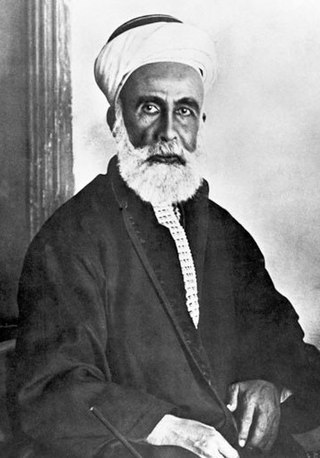
Hussein bin Ali al-Hashimi was an Arab leader from the Banu Qatadah branch of the Banu Hashim clan who was the Sharif and Emir of Mecca from 1908 and, after proclaiming the Great Arab Revolt against the Ottoman Empire, King of the Hejaz, even if he refused this title, from 1916 to 1924. He proclaimed himself Caliph after the abolition of the Ottoman Caliphate in 1924 and stayed in power until 1925 when Hejaz was invaded by the Saudis. He is usually considered as the father of modern pan-Arabism.

Prince Ali bin Al Hussein is the third son of King Hussein of Jordan, and the second child of the king by his third wife, Queen Alia. He is also the half brother of King Abdullah II. He is a member of the Hashemite family, which has ruled Jordan since 1921 and claims to be a descendant of the Islamic prophet Muhammad.
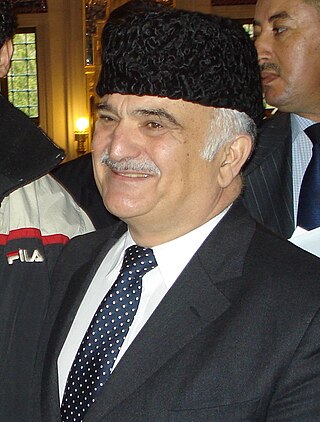
Prince El Hassan bin Talal is a member of the Jordanian royal family who was previously Crown Prince from 1965 to 1999, being removed just three weeks before King Hussein's death. He is now 20th in line to succeed his nephew King Abdullah II.

Hamzah bin Al Hussein, is the fourth son of King Hussein bin Talal of Jordan overall and the first by his American-born fourth wife, Queen Noor. He was named Crown Prince of Jordan in 7 February 1999, a position he held until his older half-brother, King Abdullah II, rescinded it in 28 November 2004. He is a member of the Hashemite dynasty, the royal family of Jordan since 1921, and is a 41st-generation direct descendant of Muhammad.
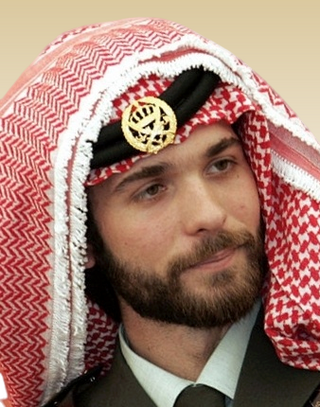
Prince Hashim bin Al Hussein is the younger of the two sons of King Hussein and Queen Noor of Jordan. In her autobiography, Queen Noor states that Hashim was named after the clan of Hashim, the tribe to which the Islamic prophet Muhammad and King Hussein belong. He is in the line of succession to the Jordanian throne.
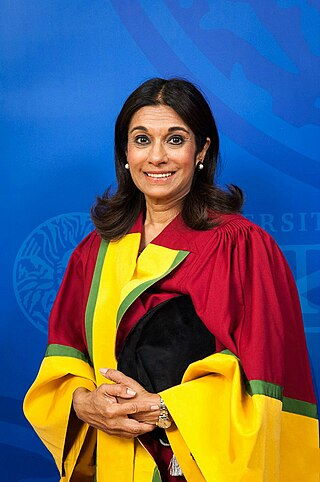
Princess Sarvath El Hassan is a Jordanian royal and the wife of Prince Hassan bin Talal of Jordan. She was born in Calcutta on 24 July 1947, to a prominent Muslim family, the Suhrawardy family of the Indian subcontinent.

Hussein bin Abdullah is Crown Prince of Jordan as the eldest son of King Abdullah II and Queen Rania. He is a member of the Hashemite dynasty, the royal family of Jordan since 1921, and is considered to be 42nd-generation direct descendant of the Islamic prophet Muhammad.

Jordan contains one of the oldest Christian communities in the world, their presence dating back to the crucifixion of Jesus Christ early in the 1st century AD. Christians today make up about 3% of the population. Jordanian Christians in a country of almost 10 million are thought to number 250,000-400,000, down from 20% in 1930, but their absolute numbers have increased. This is due to high immigration rate of Muslims into Jordan, higher emigration rates of Christians and higher birth rates for Muslims. All Christian religious ceremonies are allowed to be publicly celebrated in Jordan.
Prince Hashem bin Abdullah is the youngest child and second son of King Abdullah II of Jordan and Queen Rania. He is a member of the Hashemite dynasty, who have been the reigning royal family of Jordan since 1921, and is considered a 42nd-generation direct descendant of the Islamic prophet Muhammad.
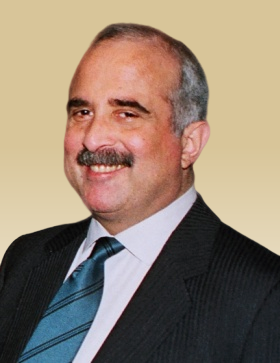
Prince Muhammad bin Talal was a member of the Jordanian royal family. He was the second son of King Talal of Jordan and the younger brother of King Hussein of Jordan. He was heir-presumptive to the throne from his elder brother's accession in 1952, until the birth of his nephew (Abdullah) in 1962.

Prince Talal bin Muhammad is a member of the Jordanian royal family. He is the eldest son of Prince Muhammad bin Talal, the younger brother of King Hussein of Jordan, and first cousin of the current King Abdullah; this makes him 13th in the line of succession to the Jordanian throne. He has one brother, Prince Ghazi.

Al al-Bayt University is a public university in Jordan. It is located on the outskirts of the city of Mafraq, 65 Kilometers to the north-east of the capital Amman. The university has integrated academic facilities, student housing, and social services on one site, extending over an area of 7.539 square kilometers. The university ranks among the top ten universities in the Kingdom.

Line of succession to the Jordanian throne is the line of people who are eligible to succeed to the throne of the Hashemite Kingdom of Jordan. The succession is regulated by Article 28 of the Constitution of Jordan.

Princess Firyal is a Jordanian humanitarian and philanthropist.
The Royal Aal al-Bayt Institute for Islamic Thought (RABIIT) is an international Islamic non-governmental, independent institute in Amman, Jordan. It is affiliated with the Royal Islamic Strategic Studies Centre.
The Royal Islamic Strategic Studies Centre is a research centre affiliated with the Royal Aal al-Bayt Institute for Islamic Thought.
Nuh Ali Salman al-Qudah was a Jordanian Muslim scholar and the Grand Mufti of Jordan from 2007 to 2010.
